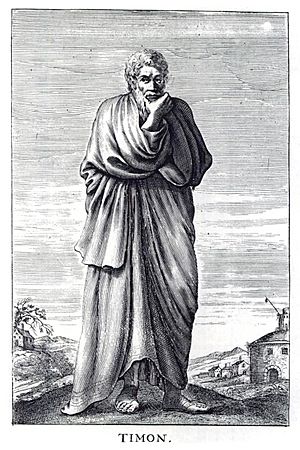Timon of Phlius facts for kids
Quick facts for kids
Timon of Phlius
|
|
|---|---|

Timon of Phlius, 17th-century engraving
|
|
| Born | c. 325-320 BCE Phlius
|
| Died | c. 235-230 BCE (aged c. 90) |
| Era | Hellenistic philosophy |
| Region | Western philosophy |
| School | Skepticism |
|
Main interests
|
Epistemology |
|
Influences
|
|
|
Influenced
|
|
Timon of Phlius was an ancient Greek philosopher. He lived around 320 BC to 235 BC. Timon was a student of a famous philosopher named Pyrrho.
Pyrrho did not write any books. But Timon wrote many things, including funny poems called Silloi. He also wrote other prose works. Most of his writings are now lost. However, we know about his ideas from small pieces quoted by other writers.
Contents
Timon's Life Story
We learn about Timon's life mostly from an ancient writer named Diogenes Laërtius. Diogenes gathered information from older books that are now gone.
Timon was born in a place called Phlius. At first, he was a dancer in the theater. But he decided to study philosophy instead. He moved to Megara and studied with Stilpo.
Later, Timon went back home to get married. Then he moved to Elis with his wife. There, he met Pyrrho and learned his ideas. Timon liked Pyrrho's way of thinking.
Timon had to leave Elis because he was poor. He traveled to the Hellespont and Propontis. He taught in Chalcedon as a sophist. A sophist was a teacher who taught people how to argue well. Timon was very good at it and earned a lot of money.
After that, he moved to Athens. He lived there until he died, except for a short time in Thebes. He lived to be almost 90 years old. Diogenes says Timon knew kings like Antigonus and Ptolemy II Philadelphus.
Timon was also connected to other writers. He helped Alexander Aetolus and Homerus with their plays. He also taught Aratus.
Timon's Writings
Timon wrote many different kinds of works. He wrote poems, plays, and comedies. He also wrote his famous Silloi. Many of his works have not survived to today. But ancient writers often mentioned and quoted from his Silloi.
The Silloi Poems
The Silloi were Timon's most famous poems. The word Silloi means something like "squint-eyed" or "mocking." These poems were funny and sarcastic. Another philosopher, Xenophanes, is said to have invented this type of poetry.
Timon's Silloi had three books. In the first book, Timon spoke in his own voice. The other two books were a conversation between Timon and Xenophanes. Timon would ask questions, and Xenophanes would answer.
The poems made fun of the ideas of many philosophers, both living and dead. They showed a lot of doubt and humor. The Silloi were written in a special poetry style called hexameter verse. Ancient writers thought they were excellent. Other scholars even wrote explanations about Timon's Silloi.
Other Poems
Timon also wrote a poem called Images. This poem was similar to the Silloi in its topic. He also wrote iamboi, which were often satirical poems.
Timon believed that most philosophers were "too clever" and "murderers of wise sayings." He only praised two philosophers:
- Xenophanes, who was "the modest censor of Homer's lies."
- Pyrrho, against whom "no other mortal dare contend."
None of his plays have survived. We don't know much about his epic poems. They were probably funny or sarcastic poems written in the epic style. His poem Funeral Banquet of Arcesilaus was likely a satirical epic poem too. He also made fun of Homer's works. Some small parts of his poems about skepticism have also been saved.
Prose Works
Timon also wrote many prose works, which means they were not poems. Diogenes Laërtius said he wrote about 20,000 lines of prose. These works were about philosophical topics.
Some of his prose works included:
- On Sensations
- On Inquiries
- Towards Wisdom
- Against the Physicists (where he questioned scientific ideas)
The longest surviving quote from Timon is from his work called Python. This work described a long talk he had with Pyrrho. They had this conversation while traveling to the Delphic oracle. Timon wrote:
'The things themselves are equally indifferent, and unstable, and indeterminate, and therefore neither our senses nor our opinions are either true or false. For this reason then we must not trust them, but be without opinions, and without bias, and without wavering, saying of every single thing that it no more is than is not, or both is and is not, or neither is nor is not.
This quote means that things in the world are not clear or fixed. So, what we see or think might not be true or false. Because of this, we should not fully trust our senses or opinions. Instead, we should try to be open-minded and not have strong beliefs about things.
See also
 In Spanish: Timón el Silógrafo para niños
In Spanish: Timón el Silógrafo para niños
Images for kids
 | Valerie Thomas |
 | Frederick McKinley Jones |
 | George Edward Alcorn Jr. |
 | Thomas Mensah |


